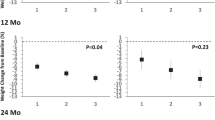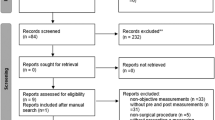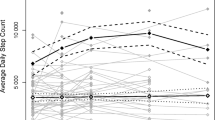Abstract
OBJECTIVE: To investigate the sustained effectiveness of a novel skill-based intervention for weight loss.
DESIGN: Randomized, controlled trial.
SUBJECTS: A total of 80 overweight/obese women living in Connecticut.
MEASUREMENTS: Absolute weight difference measured in pounds and absolute change in body mass index (BMI). Secondary outcomes included changes in food frequency questionnaire (FFQ) data and waist-to-hip ratio.
RESULTS: In all 61, 35, and 34% of study participants completed the 6-, 12-, and 24-month assessments, respectively. At 6 months postintervention, both counseling-based (CBI) and skill-based (SBI) intervention groups had statistically significant decreases in absolute weight (4.0±3.6 and 1.7±3.0 kg, respectively). Compared to their baseline values, both CBI and SBI groups still maintained weight losses at 24 months (1.1±5.8 and 0.59±3.3 kg, respectively); however, the differences were not statistically significant. FFQ results showed that, within the SBI group, there was a significant decrease (P<0.05) in percent fat from baseline to 12 months and a nearly significant decrease in saturated fat from baseline to 24 months (P=0.07).
CONCLUSIONS: Both the novel SBI and conventional dietary counseling demonstrated some residual weight loss benefit at 2 y. Effects of the SBI on dietary intake patterns are encouraging, and warrant further study.
This is a preview of subscription content, access via your institution
Access options
Subscribe to this journal
Receive 12 print issues and online access
$259.00 per year
only $21.58 per issue
Buy this article
- Purchase on Springer Link
- Instant access to full article PDF
Prices may be subject to local taxes which are calculated during checkout

Similar content being viewed by others
References
Allison DB, Fontaine KR, Manson JE, Stevens J, VanItallie TB . Annual deaths attributable to obesity in the United States. JAMA 1999; 282: 1530–1538.
Flegal KM, Carroll MD, Ogden CL, Johnson CL . Prevalence and trends in obesity among US adults, 1999–2000. JAMA 2002; 288: 1723–1727.
Ogden CL, Flegal KM, Carroll MD, Johnson CL . Prevalence and trends in overweight among US children and adolescents, 1999–2000. JAMA 2002; 288: 1728–1732.
US Department of Health and Human Services. The surgeon general's call to action to prevent and decrease overweight and obesity. Centers for Disease Control and Prevention, National Institutes of Health: Washington, DC; 2001.
Pi-Sunyer F . Short term medical benefits and adverse effects of weight loss. Ann Intern Med 1993; 119: 722–726.
Goldstein D . Beneficial effects of weight loss. Int J Obes Relat Metabol Disord 1992; 16: 397–415.
Blackburn G . Effect of degree of weight loss on health benefits. Obes Res 1995; 3 (Suppl 2): 211s–216s.
Collins R, Anderson J . Medication cost savings associated with weight loss for obese non insulin dependent diabetic men and women. Prev Med 1995; 24: 369–374.
Pasanisi F, Contaldo F, de Simone G, Mancini M . Benefits of sustained moderate weight loss in obesity. Nutr Metab Cardiovasc Dis 2001; 11: 401–406.
Pi-Sunyer F . A review of long-term studies evaluating the efficacy of weight loss in ameliorating disorders associated with obesity. Clin Ther 1996; 18: 1006–1035.
Perri MG, Fuller PR . Success and failure in the treatment of obesity: where do we go from here? Med Exer Nutr Health 1995; 4: 255–272.
Committee to Develop Criteria for Evaluating the Outcomes of Approaches to Prevent and Treat Obesity. Weighing the options: criteria for evaluating weight-management programs. Institute of Medicine: Washington, DC; 1995.
Skender M, Goodrick G, DelJunco D, Reeves R, Darnell L, Gotto A, Foreyt JP . Comparision of a 2-year weight loss trends in behavioral treatments of obesity: diet exercise, and combination interventions. J Am Diet Assoc 1996; 96: 342–346.
Ayyad C, Andersen T . Long-term efficacy of dietary treatment of obesity: a systematic review of studies published between 1931 and 1999. Obes Rev 2000; 1: 113.
Saris W . Very-low-calorie diets and sustained weight loss. Obes Res 2001; 9: 295S–301S.
Flechtner-Mors M, Ditschuneit H, Johnson T, Suchard M, Alder G . Metabolic and weight loss effects of long-term dietary intervention in obese patients: four-year results. Obes Res 2000; 8: 399–402.
Katz D, Chan W, Gonzalez M, Larson D, Nawaz H, Abdulrahman M, Yeh M-C . Technical skills for weight loss: preliminary data from a randomized trial. Prev Med 2002; 34: 608–615.
Nawaz H, Chan W, Abdulrahman M, Larson D, Katz D . Self-reported weight and height: implications for obesity research. Am J Prev Med 2001; 20: 294–298.
DiPietro L, Caspersen C, Ostfeld A, Nadel E . A survey for assessing physical activity among older adults. Med Sci Sports Exerc 1993; 25: 628–642.
Harvard School of Public Health. Brigham and women's hospital diet assessment, semi-quantitative food frequency questionnaire, SFFQ, Data Dictionary, 1988.
SAS I. SAS Release 6.12. SAS: Cary, NC; 1996.
Katz D, Nawaz H, Jennings G, Chan W, Ballard J, Comerford B, Spargo K, Walsh J . Community health promotion and the randomized, controlled trial: approaches to finding common ground. J Public Health Manage Prac 2001; 7: 33–40.
Katz D . Behavior modification in primary care: the pressure system model. Prev Med 2001; 32: 66–72.
Katz DL . Nutrition in clinical practice. Lippincott Williams & Wilkins: Philadelphia, PA; 2001.
American Dietetic Association. Position of the American Dietetic Association: weight management. J Am Diet Assoc 1997; 97: 71–74.
American Dietetic Association. Weight management medical nutrition therapy protocol. In: Inman-Felton A, Johnson E, Smith K (ed). Medical nutrition therapy across continuum of care. American Dietetic Association: Chicago, IL; 1997.
SAS. SAS release 8.1. SAS: Cary, NC; 2000.
Anderson J, Vichitbandra S, Qian W, Kryscio R . Long-term weight maintenance after an instensive weight-loss program. J Am Coll Nutr 1999; 18: 620–627.
Krummel DA, Humphries D, Tessaro I . Focus groups on cardiovascular health in rural women: implications for practice. J Nutr Educ Behav 2002; 34: 38–46.
Perri M, Nezu A, McKelvey W, Shermer R, Renjilian D, Viegener B . Relapse prevention training and problem-solving therapy in the long-term management of obesity. J Consult Clin Psychol 2001; 69: 722–726.
Hakala P, Karvetti RL, Ronnemaa T . Group vs individual weight reduction programmes in the treatment of severe obesity—a five year follow-up study. Int J Obes Relat Metab Disord 1993; 17: 97–102.
Bray G, Popkin B . Dietary fat intake does affect obesity! Am J Clin Nutr 1998; 68: 1157–1173.
Sacks FM, Katan M . Randomized clinical trials on the effects of dietary fat and carbohydrate on plasma lipoproteins and cardiovascular disease. Am J Med 2002; 113 (Suppl 9B): 13S–24S.
Wadden TA, Frey DL . A multicenter evaluation of a proprietary weight loss program for the treatment of marked obesity: a five-year follow-up. Int J Eat Disord 1997; 22: 203–212.
Latner JD, Wilson GT, Stunkard AJ, Jackson ML . Self-help and long-term behavior therapy for obesity. Behav Res Ther 2002; 40: 805–812.
Acknowledgements
We acknowledge the assistance of Mrs Michelle LaRovera in the preparation of the manuscript and Mrs Jennifer Ballard for logistic support of the study. This study was supported by Grant U48/CCU115802 from the Centers for Disease Control and Prevention.
Author information
Authors and Affiliations
Corresponding author
Rights and permissions
About this article
Cite this article
Yeh, MC., Rodriguez, E., Nawaz, H. et al. Technical skills for weight loss: 2-y follow-up results of a randomized trial. Int J Obes 27, 1500–1506 (2003). https://doi.org/10.1038/sj.ijo.0802430
Received:
Revised:
Accepted:
Published:
Issue Date:
DOI: https://doi.org/10.1038/sj.ijo.0802430
Keywords
This article is cited by
-
Differences in Weight Loss Across Different BMI Classes:A Meta-analysis of the Effects of Interventions with Diet and Exercise
International Journal of Behavioral Medicine (2014)
-
Changes in self-efficacy and dietary adherence: the impact on weight loss in the PREFER study
Journal of Behavioral Medicine (2008)



